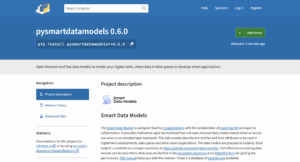There is a new data model in the subject water quality, sludgequalityobserved.
Thanks to the project B-WaterSmart
- SludgeQualityObserved. Sludge Quality data model is intended to represent sludge quality parameters.
There is a new data model in the subject water quality, sludgequalityobserved.
Thanks to the project B-WaterSmart
There are two new data models in the subject tourist destinations, TouristRental and ConsumptionBehaviour.
These data models are contributed thanks to the project I4trust for data spaces and the group Tourilab.
A new data model in the subject Organization, Person, mapped from schema.org.
There is a new version of the python package for pysmartdatamodels 0.6.0.
This python package includes all the data models and several functions to use them in your developments.
Changelog:
– Four new functions
– Acknowledgement session has been added into the README.

Get more details on the pypi page and feel free to try it out!
We are considering to officially provide an attestation of your contributions to SDM.
Before launching it officially we have created a drafted document for those contributors with a valid mail and name (there are people who do not want to disclose their contribution).
Accordingly, if you browse the database of contributors you will see a new column with the heading attestation and a download draft link.
By clicking on that link you can download the draft version of an attestation of your contribution.
We’ll be glad to receive your feedback on this initiative and the format and content of the attestation in the info@smartdatamodels.org address.
You can see an example below
attestation_alberto.abella@fiware.org_dataModel.Agrifood_2022
Now you can see in the right widget a new entry with the link for our channel on discord #smart-data-models, you can also send your question there. (But only once you have joined by using this invitation )
If you need help on discord channel you can browse this link.

There is a new subject SDG, and 3 new data models related to the follow up of achievement of SDG by an organization through their projects and actions. Thanks to the contributors of the FIWARE Space of the Diputación de Badajoz (Spain) and their project Plataforma Provincial de Servicios Inteligentes (Provincial platform for smart services) providing services to 160 municipalities/400.000 inhabitants
Action. Each activity that provides real development of a project, having associated budget, planning and execution. With a declared impact in one or some ODS in the form of a % of the budget.
Indicator. Measure of a project’s degree of development. Associated to target values to be reached and monitored. Divided in impact indicators and management ones.
Project. Set of activities that, when executed support the compliance of a strategic goal (Provision of Key Services, Management Evolution, Close contact with Territory, Enterprises Boosting, Focused Investment, Social/Cultural/Sports Promotion, etc.). This goal itself is composed of one or more project,s and address one of the strategic axes (Work model, Economic development, Social development, Environmental Development) that give a high level shape to the Strategic Plan
New data model at Environment subject, Night Sky Quality
We have released two very simple programs to create an entity in a context broker and for removing an entity based on its id.
Although this is pretty straight forward, being coded in PHP allows you to integrate with, in example, in a WordPress site.
In fact these programs are working in the test Orion-LD broker option, located here at home -> tools -> test Orion-LD broker
The source code is available at the utils directory and the data-models umbrella repository
In the tools menu there is a new option “Test Orion-LD broker“.
In this address https://smartdatamodels:1026 there is an Orion-LD Broker installed open for testing purposes. You can check
It is wiped out every hour, on minute 27, and then repopulated with some hundreds of examples (most of the current examples in data models).
Some examples of queries: